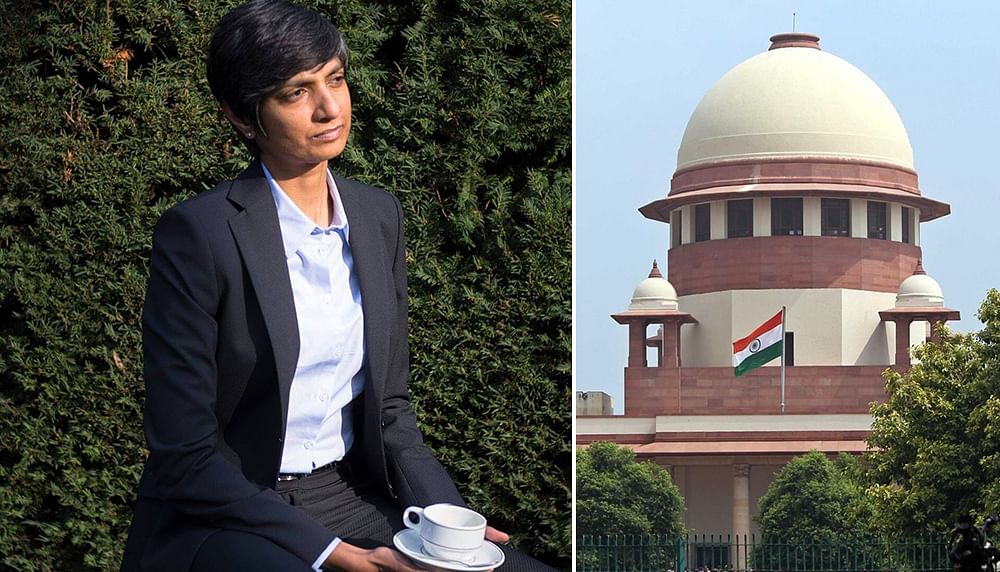The same sex marriage case will be heard on April 18 by a five-judge bench presided by CJI Chandrachud.

The Supreme Court has established a five-judge Constitution bench in order to consider petitions seeking legal recognition of same-sex marriages. The tribunal established by Chief Justice of India D Y Chandrachud includes Justices Sanjay Kishan Kaul, Ravindra Bhat, Hima Kohli, and PS Narasimha.
The Supreme Court referred the petitions to the Constitution bench on March 13, stating that the matter posed questions of “fundamental importance.” In its reference order, a three-judge bench presided over by the CJI stated that the submissions on the issue entail the interaction between constitutional rights on the one hand and specific legislative enactments, such as the Special Marriage Act, as well as the rights of transgender couples on the other.
The three-judge panel has scheduled the hearing for April 18.
The reference order stated, “Having due regard for the broader context of the petitions… and the interrelationship between the statutory regime and constitutional rights, we are of the considered opinion that the issues raised should be resolved by a Constitution bench of five judges of this court, having due regard for the provisions of Article 145(3) of the Constitution.” A minimum of five judges are required to consider cases involving “a substantial question of law regarding the interpretation” of the Constitution, per Article 145(3).
The Central government, which opposes the petitions, has implored the Supreme Court to let Parliament decide the issue. It informed the highest court that a “legislative understanding of marriage in the Indian statutory and personal law regime” refers to only marriages between biological males and women and that any interference “would cause complete havoc.”
In Navtej Singh Johar v. Union of India, the government argued that any “recognised deviation…can only occur before the competent legislature” and that same-sex marriage cannot be recognised by law “despite the decriminalisation of Section 377 (homosexuality)” of the Indian Penal Code. Tushar Mehta, representing the Centre, told the court that “nobody is interfering” with “the right to love, the right to express, and the freedom of choice” as outlined in the Navtej Singh Johar decision.
He noted, however, that the highest court was “extremely cautious” in stating that this ruling “should not be construed as conferring any right, including the right to marriage.”
Mehta had argued that “granting recognition and legal sanction to a relationship is primarily the responsibility of the legislature, and for more than one reason.” “The Parliament will have to debate and decide whether we want this institution to be recognised in light of the societal ethos and other factors that go into lawmaking,” he stated.
Mehta stated in his affidavit that the Centre’s affidavit mentioned existing provisions in the various marriage-related laws that explicitly relate to only biological men and women, and that if same-sex marriage is legalised, these laws would become obsolete.
Abhishek Manu Singhvi, a senior advocate who represented some of the petitioners, countered by stating, “the right to love, which the Supreme Court explained in its ruling decriminalising same-sex relationships, is the right that makes us human.” As a result of the decriminalisation of Section 377, he stated, “the right to marry cannot be denied to a group of people solely on the basis of their gender, sexual orientation, or gender identity.” In the event that the right to marry is extended to such groups, he argued, it should be extended on equal terms.
Also appearing on behalf of some petitioners, Senior Advocate N K Kaul stated that the Special Marriage Act addresses marriages between any two individuals. In the Navtej Singh Johar decision, the Supreme Court “categorically stated that the right to life includes the dignity and choice of family, marriage, procreation, and sexual orientation, and that it belongs to every individual, including the LGBTQ community,” he said.
“In the Puttaswamy case, the Supreme Court ruled that same-sex couples have the right to privacy when making important personal decisions, including the right to marry. In Deepika Singh, the Supreme Court ruled that unconventional manifestations of love and family by same-sex couples deserve equal protection under the law and benefits under various legislations,” Kaul said, adding, “if we holistically look at all these judgements, the rights that your lordships have recognised of same-sex couples and the community are far beyond a narrow pedantic interpretation sought to be given to the Special Marriages Act by saying that in one paragraph, male and female is used interchangeably.”
Also Read |Tahir Mahmood on same-sex marriage: Existing matrimonial law should only apply to the’sanskaar’ known as’marriage’
Senior Counsel Menaka Guruswamy, who also represented the petitioners, stated, “The legislative intent of the Hindu Marriage Act necessitates the recognition of same-sex marriage because Section 5 of the Act refers to marriage between two Hindus.” She stated, “When Ambedkar presented this, the objections he received regarding inter-caste marriage, widow remarriage, etc. were very similar to what the Solicitor General is saying now.”
After the Supreme Court referred the case to the Constitution bench, the Muslim organisation Jamiat-Ulema-i-Hind filed an application opposing the petition for legal recognition of same-sex marriages and seeking to join the case as a party. Since the inception of Islam, homosexuality has been categorically forbidden. “From the primary religious text, the Holy Quran, to the prohibitions placed through the teachings of the Prophet Muhammad, the primary legislator, to the interpretations available in the work on Islamic teachings on gender relations and sexuality, the position of Islam with regard to the prohibition on homosexuality is uncontested and well-established,” the report stated.



